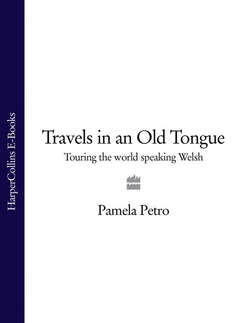Читать книгу Travels in an Old Tongue: Touring the World Speaking Welsh - Pamela Petro - Страница 34
Sylwi to Notice
ОглавлениеEd has come home, and the four of us are going to an outdoor concert. Rhiannon and … Ed. In a tie-dyed shirt and sandals, Rhiannon is convincingly down-to-earth despite being named for the personification of a deity. In the First Branch of ‘The Mabinogi’, the character Rhiannon – who spawned the name that has taken hold of parents in Wales as completely as the wretched Ashley has in the States – is a powerhouse who still bears traces of magic about her, left over from her former role as a goddess of horses in the prehistoric Celtic pantheon. Rhiannon of Delft is not my idea of a horse goddess, for which I’m grateful, but the name remains hard to pair with ‘Ed’.
Ed is a geologist and a quiet, wry mumbler with an Irish accent (‘Irish Gaelic lurks in him, too,’ they assure us, though it’s skulking somewhat deeper than Rhiannon’s Welsh). Tonight the two of them lead us out through the fresh, sea-smelling dusk to a canalside café. As in Amsterdam, Delft’s city blocks have been turned into an adjoining series of islets by an intricate canal system, begun around 1100. The canal we’re sitting next to has a lustre like molten jade, which deepens as the sun sinks, and is threaded with flowering lily pads. A trio – two violinists and a pianist – bob on a flat-bed barge and play until it gets dark. Further down the canal a pack of kayakers sit absolutely still in two-person skiffs, paddles across their laps, rapt.
We talk softly. Rhiannon tells us she would never have been caught dead baking Welsh cakes in Wales, but last year found herself making a ton of them for the Welsh Society, which has about fifty members.
‘The things you do when you leave home,’ she says, wincing.
‘It’s hiraeth,’ adds Ed.
I broach my hiraeth theory about Wales and Portugal. One clings to the western edge of an island, the other to the western edge of a peninsula; both are tiny nations hemmed in by the sea and bullied by bigger, wealthier neighbours to the east. And both suffer from the same malaise, which in Wales is called hiraeth and in Portugal saudade, a kind of longing that is more than simple homesickness, because you can get it at home too. It’s a lament not just for what has been lost, but for what should have been but never was; a weary and, so far, an impotent protest that history hasn’t played fair.
We all fall silent. In a window above the musicians’ barge a woman lights a cigarette, backlit by a pale, incandescent glow. She turns her profile to the flared match and puffs out the window, smudging the blue twilight. I wonder if she’s rehearsed this gesture, and then I know, with utmost certainty, that had we been speaking Welsh just now instead of English, I never would have noticed her.
